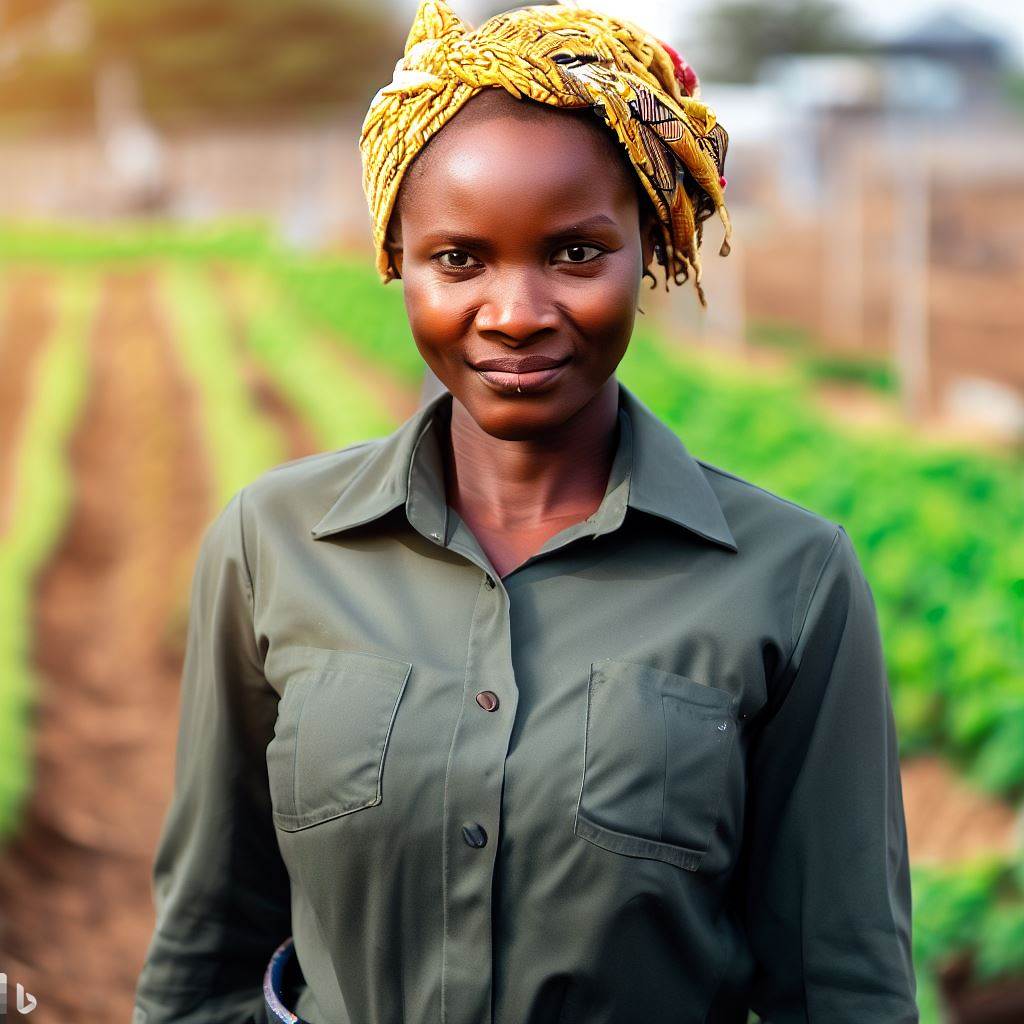Introduction
Farmers Coping with Climate Change face challenges, impacting their livelihood and food security.
Agriculture plays a crucial role in Nigeria’s economy, making it vital to address these issues effectively.
Amid changing climate Farmers Coping with Climate Change, Nigerian farmers battle adverse impacts.
These changes threaten their ability to produce enough crops to sustain themselves and contribute to the national food supply.
Agriculture bolsters Nigeria’s economy, employing a large population and constituting a significant portion of the GDP.
The Importance Of Agriculture In Nigeria’s Economy
The importance of agriculture in Nigeria goes beyond providing food and income. It also serves as a means to reduce poverty, enhance rural development, and ensure national food security.
Through exporting crops like cocoa, palm oil, and rubber, the sector vitalizes foreign exchange earnings significantly.
Farmers Coping with Climate Change, climate change and its associated impacts pose suffer threats to the agricultural sector in Nigeria.
Lacking adaptation and mitigation, farmers confront lower productivity, heightened pest susceptibility, and reduced irrigation water access.
To address these challenges, concerted efforts and investments must be made to support Nigerian farmers in coping with climate change.
This includes providing access to climate-smart agricultural practices, improved agricultural infrastructure, and financial assistance for adopting climate adaptation strategies.
This way, Nigerian farmers can endure climate change adversities and ensure a sustainable agricultural future for Nigeria.
Read: In-depth Look at the Livestock Value Chain in Nigeria
The Impact Of Climate Change On Nigerian Farmers
Nigerian farmers are facing significant challenges due to the impact of climate change.
There are several ways in which climate change affects Nigerian farmers:
Transform Your Career in Nigeria
Discover unmatched expertise with our personalized Career Consulting service. Navigate Nigeria’s job market with a strategy tailored just for you.
Get Started- Changes in rainfall patterns have led to frequent droughts or floods.
- The increased temperature affects crop growth and livestock rearing.
- The expansion of pests and diseases poses a threat to agricultural productivity.
- Soil erosion and depletion further exacerbate the challenges faced by farmers.
These impacts have severe consequences for the livelihoods and food security of Nigerian farmers.
Altered rain patterns yield unpredictable growing seasons, complicating farmers’ planting and harvesting planning.
The expansion of pests and diseases is another consequence of climate change.
Warmer temperatures and changes in rainfall patterns create a more favorable environment for pests to thrive.
Crop diseases spread more rapidly, affecting entire farms and leading to significant crop losses. Farmers need to invest more in pest control measures, which increase their expenses.
The consequences of these impacts on farmers’ livelihoods and food security are dire. Agriculture is the main source of income for many Nigerians, especially those living in rural areas.
Reduced crop yields and livestock productivity lead to income loss and increased poverty. Farmers find it difficult to meet their basic needs and provide for their families.
Food security is also compromised. Nigeria heavily relies on agriculture for its food supply.
With climate change affecting the productivity of farms, there is a higher risk of food scarcity and rising food prices.
Shifts in rain patterns, higher temperatures, pest growth, diseases, and soil erosion challenge farmers’ lives and food security.
Immediate actions and adaptations are vital to back Nigerian farmers and counter climate change impacts on agriculture.
Navigating Unpredictable Rainfall Patterns In Nigerian Farmers’ Challenge
Shifts in rainfall patterns disrupt farming routines, resulting in either severe droughts or unexpected floods.
By adapting practices, Nigerian farmers strive to manage unpredictable rainfall patterns and secure their livelihoods.
Rising Temperatures As A Challenge for Nigerian Farmers
Escalating temperatures disrupt crop growth and livestock rearing, posing formidable challenges.
Effects
- Heat Stress: Crops and animals endure heat stress, affecting health, productivity, and growth.
- Reduced Yields: High temperatures shorten growing periods, limiting crop yields and quality.
- Water Scarcity: Increased heat intensifies water evaporation, causing water scarcity and irrigation challenges.
- Livestock Impact: Heat-stressed livestock face decreased appetite, growth, and reproduction rates.
- Shade Provision: Farmers create shaded areas for livestock comfort.
- Timely Irrigation: Efficient irrigation mitigates water loss due to heat.
- Heat-Tolerant Crops: Selecting resilient crop varieties counter yield losses.
- Cooling Techniques: Farmers employ misting systems and cooling mechanisms for livestock.
Escalating Threat Of Rapid Expansion of Pests and Diseases
- Unpredictable Spread: Pests and diseases infiltrate new regions due to global trade, climate change, and human movement.
- Devastating Impact: Crops suffer yield loss, economic downfall, and food scarcity as pests and diseases multiply.
- Agricultural Vulnerability: Monoculture and lack of biodiversity create favorable environments for pest outbreaks and disease epidemics.
- Livestock Under Siege: Livestock industries combat diseases like African swine fever and avian influenza, risking food supplies.
- Human Health at Risk: Vector-borne diseases surge, threatening populations with illnesses like Zika, Lyme disease, and malaria.
- Challenges Amplified: Pesticide resistance and limited access to effective treatments hinder control efforts against pests and diseases.
- Innovative Strategies: Integrated pest management, genetic resistance, and biosecurity protocols offer sustainable solutions for containment.
- Global Collaboration: Governments, researchers, and industries must collaborate to curb the expansion of pests and diseases, securing our future.
Battling Soil Erosion and Depletion
- Unseen Threat: Soil erosion jeopardizes agricultural vitality, stripping away nutrient-rich topsoil and compromising crop yield.
- Human Impact: Deforestation, improper land use exacerbate erosion, leaving once-fertile fields barren and vulnerable to weather elements.
- Nature’s Alarm: Gullies and landslides expose the urgency of combating erosion, urging sustainable land management practices.
- Guarding Resources: Cover crops, contour plowing, and terracing minimize erosion, preserving soil integrity for future generations.
- Waterway Woes: Eroded soil clogs waterways, degrading water quality and disrupting aquatic ecosystems, demanding immediate remediation.
- Global Consequences: Soil depletion diminishes food security, amplifying world hunger and necessitating international cooperation for effective solutions.
- Empowering Change: Education plays a pivotal role; raising awareness about erosion’s impacts empowers communities to embrace conservation.
- Innovative Tech: Remote sensing and erosion-control fabrics offer hope, aiding efforts to combat erosion, rejuvenate soil, and ensure sustenance.
- Immediate Action: Governments, farmers, and citizens must unite to combat erosion’s relentless advance, securing our Earth’s precious foundation.
Consequences of Impacts On Farmers
- Crop Vulnerability: Irregular rain hampers planting and growth, lowering yields and quality.
- Delayed Planting: Inconsistent rain delays planting, shortening growing seasons and affecting crop development.
- Water Stress: Droughts parch fields, causing water scarcity for irrigation and livestock.
- Soil Erosion: Intense rainfall erodes topsoil, reducing fertility and hampering future productivity.
- Rainwater Harvesting: Farmers collect rain for irrigation during dry spells.
- Diverse Crops: Crop variety enhances resilience to erratic rainfall patterns.
- Conservation Agriculture: Reduced tillage preserves soil moisture and structure.
- Smart Irrigation: Efficient water management counters drought impacts.
- Climate-Resilient Seeds: Selecting adaptable seeds minimizes crop loss risks.
Read: Insights on the Salary Scale of Agricultural Operations Managers in Nigeria
Coping Strategies Adopted by Nigerian Farmers
Nigerian farmers grapple with climate change consequences: rising temperatures, erratic rainfall, and recurrent droughts hamper agricultural productivity.
In response to these challenges, they have developed various coping strategies to mitigate the adverse effects and sustain their livelihoods.
Different Approaches by Farmers Coping with Climate Change
1. Diversification of Crops and Livestock
Nigerian farmers have recognized the importance of diversifying their crops and livestock to buffer against the impact of climate change.
Growing diverse crops and rearing multiple livestock types reduces the risk of complete crop or livestock loss.
This strategy helps them sustain their income and food security even in the face of changing climatic conditions.
2. Adoption of Climate-Smart Agricultural Practices
Many Nigerian farmers have embraced climate-smart agricultural practices to adapt to the changing climate.
These practices include conservation agriculture, agroforestry, and organic farming.
Using mulching, crop rotation, and intercropping, farmers boost soil moisture, fertility, and resilience against extreme weather impacts.
3. Utilization of Improved Irrigation Techniques
Nigerian farmers have recognized the need to minimize their reliance on rainfall and have started utilizing improved irrigation techniques.
Farmers invest in small-scale drip and sprinkler irrigation for consistent crop water supply assurance.
This enables them to continue farming even during periods of drought or insufficient rainfall.
4. Enhancing Soil Conservation Measures
Terracing, contour plowing, and cover crops for enhanced soil structure and moisture retention.
These measures help maintain soil fertility and resilience in the face of climate-related challenges.
Success Stories of Farmers Adapting to Climate Change
There are inspiring success stories of Nigerian farmers who have effectively adapted to climate change. One such story is that of Amina, a smallholder farmer in the Sokoto State.
Faced with recurring droughts, Amina decided to diversify her crops and introduced drought-tolerant varieties of maize and millet.
She also adopted conservation agriculture techniques, such as minimum tillage and residue retention.
These practices not only improved her crop yields but also conserved water and enhanced soil fertility.
Publish Your Professional Profile, Business or Brand
Showcase your expertise, gain trust, and boost visibility instantly on Professions.ng.
Publish NowAnother success story is that of Ibrahim, a farmer in Kano State.
Ibrahim started utilizing drip irrigation technology on his farm, enabling him to grow vegetables throughout the year.
This boosted his income and lessened climate vulnerability, as he wasn’t solely reliant on rainfall.
These success stories highlight the importance of adopting climate-smart practices and diversifying agricultural systems.
By sharing these experiences, Nigerian farmers can learn from each other and strengthen their resilience to climate change.
Nigerian farmers have implemented various coping strategies to mitigate the effects of climate change.
Farmers adapt by diversification, climate-smart practices, advanced irrigation, and soil conservation, sustaining livelihoods effectively.
Successful adaptations set examples for fellow farmers, driving a climate-resilient agricultural sector transformation in Nigeria.
Read: Sustainable Farming Practices for Nigerian Farmers

Explore Further: Aquaculture Careers: Profiting from Nigeria’s Waters
Challenges Faced by Nigerian Farmers in Adapting to Climate Change
Nigerian farmers are facing numerous challenges in their efforts to adapt to the impacts of climate change.
Challenges span info, resource, and tech access, financial limits, and insufficient government backing and policies.
Additionally, socio-cultural factors and traditional farming practices further hinder the farmers’ ability to cope with climate change.
Obstacles Farmers’ Struggles with When Implementing Adaptive Strategies
- Financial Constraints: Limited funds hinder adoption of new technologies, resilient crops, and infrastructure upgrades.
- Knowledge Gap: Lack of information and training prevents farmers from understanding and applying adaptive techniques.
- Access to Resources: Insufficient water, quality seeds, and fertilizers impede successful implementation of adaptive strategies.
- Uncertain Climate: Erratic weather patterns challenge farmers’ ability to predict and plan for changing conditions.
- Social Inequities: Land tenure issues and gender disparities hinder vulnerable farmers from embracing adaptive measures.
- Policy Support: Inconsistent government policies fail to provide incentives and support for climate-resilient practices.
- Technical Assistance: Limited extension services and advisory support hinder farmers’ ability to adopt adaptive approaches.
- Risk Aversion: Fear of failure and unfamiliarity deter farmers from trying new methods and techniques.
- Infrastructure Gaps: Inadequate rural infrastructure disrupts supply chains and access to markets, hindering adaptation efforts.
- Time Constraints: Labor-intensive techniques demand more time, making it challenging for farmers with limited workforce.
By addressing these barriers, stakeholders can empower farmers to effectively implement adaptive strategies for a more resilient future.
Limited access to information, resources, and technology
- Farmers often lack up-to-date information on climate change patterns and its potential impacts on their farms.
- Limited access to modern farming techniques, sustainable practices, and alternative technologies makes it difficult for farmers to adapt.
Financial constraints
- High costs associated with acquiring climate-smart technologies and adopting resilient farming practices are a major barrier for most farmers.
- Inadequate financial support from banks and lending institutions prevents farmers from investing in climate change adaptation measures.
Lack of government support and policies For Farmers Coping with Climate Change
- Insufficient government intervention and policy frameworks exacerbate the challenges faced by Nigerian farmers.
- The absence of adequate subsidies, insurance schemes, and agricultural extension programs leaves farmers without necessary support.
Socio-cultural factors and traditional farming practices
- Traditional farming practices often fail to align with climate change realities and can result in reduced productivity.
- Societal norms and beliefs surrounding agriculture can discourage farmers from adopting new techniques and technologies.
The Need For Support And Intervention At Various Levels To Address These Challenges
It is crucial to provide support and intervention at various levels to address these challenges. This includes:
- Strengthening agricultural extension services: Providing training and education to farmers on climate-smart techniques and sustainable practices.
Ensuring extension workers have the necessary resources and knowledge to support farmers effectively. - Improving access to finance and resources: Establishing low-interest loans, grants, and subsidies for farmers to invest in climate change adaptation.
Facilitating access to climate-smart technologies, improved seeds, and modern farming equipment. - Enhancing climate information systems: Developing reliable weather monitoring systems that provide accurate and localized climate information.
Disseminating climate information through various channels to reach farmers in remote areas. - Formulating supportive policies and regulations: Implementing policies that incentivize climate-smart agriculture and provide a supportive environment for farmers.
Integrating climate change adaptation into national agricultural plans and strategies. - Encouraging collaboration and knowledge-sharing: Promoting partnerships between research institutions, NGOs, and farmers to exchange knowledge and best practices.
Establishing farmer cooperatives and networks for collective action and shared resources.
Limited info access, financial constraints, and insufficient government support challenge Nigerian farmers in climate change adaptation.
To address these challenges, support and intervention are needed at multiple levels.
By strengthening extension services, improving access to finance and resources, enhancing climate information systems, formulating supportive policies, and encouraging collaboration.
Nigerian farmers can better cope with climate change and secure their livelihoods.
Read: The Impact of Farming on Nigeria’s Food Security
See Related Content: Gender Diversity in Nigeria’s Agricultural Operations Management
Initiatives and solutions for supporting Nigerian Farmers Coping with Climate Change
Government agencies, NGOs, and international organizations have been working tirelessly to assist farmers in coping with climate change in Nigeria.
- Nigeria’s Federal Ministry of Agriculture established NARF, a framework to boost farmer resilience and agricultural sustainability.
- The NARF promotes climate-smart agriculture and encourages farmers to adopt sustainable practices such as agroforestry and conservation agriculture.
- The Nigerian Climate Technology Center (CTCN) provides technical support and advice to farmers on climate-smart agricultural practices.
- NFGCS, an NGO, offers training and capacity building, empowering farmers to boost resilience through programs and initiatives.
- NFGCS offers improved seeds, climate info, and financial services for farmers to counter climate change impacts effectively.
- International organizations such as the Food and Agriculture Organization (FAO) provide funding and technical support to Nigerian farmers.
- Nigeria’s NIRSAL program offers financial backing and insurance, enabling farmers to invest in climate-smart agriculture..
Programs And Projects That Have Been Implemented To Enhance Resilience Among Farmers
Knowledge sharing is crucial for sustainable agricultural practices. Farmer-to-farmer knowledge exchange programs help disseminate successful climate change adaptation strategies.
Training programs for climate-resilient farming skills empower farmers to confront climate change through capacity-building initiatives.
Financial support, such as access to microcredit, grants, and subsidies, enables farmers to invest in climate-resilient technologies and practices.
The Green Climate Fund (GCF) provides financial resources to support climate change adaptation in the agricultural sector in Nigeria.
Governments, NGOs, international organizations, and farmers’ collaboration is pivotal to effectively support and implement climate change adaptation initiatives.
Continuous evaluation and monitoring of implemented programs and projects ensure their effectiveness and enable necessary adjustments to be made.
Collaboration, knowledge sharing, and financial support are key factors in enhancing resilience and ensuring sustainable agricultural practices.
Sustainable Agriculture In Sharing, Building, and Funding for Success
In the realm of sustainable agriculture, knowledge sharing sparks innovation, fosters collaboration, and empowers farmers.
- Knowledge Sharing: When farmers exchange insights, techniques evolve and mistakes are avoided, advancing productivity sustainably.
- Capacity Building: Training programs equip farmers with the skills needed to adopt modern, eco-friendly farming methods.
- Financial Support: Adequate funding bridges the gap between traditional practices and modern, sustainable approaches.
By sharing firsthand experiences and expertise, farmers create a reservoir of practical wisdom that accelerates agricultural progress.
Conclusion
Nigerian farmers are facing immense challenges due to climate change.
We have discussed how rising temperatures, unpredictable rainfall, and increased pests and diseases are affecting their crops and livelihoods. These impacts have severe implications for food security in Nigeria.
Addressing climate change is crucial for Nigerian farmers’ survival and ensuring nationwide food security in the long term.
Failure to take action now will result in irreversible damage to agricultural productivity and exacerbate poverty and hunger.
We must support and advocate for policies that prioritize agricultural adaptation and resilience in the face of climate change.
This encompasses investing in climate-smart technology research, granting farmers information access, resources, and sustainable practices implementation.
It is crucial to build partnerships and collaborations between governments, international organizations.
And local communities to create a coordinated response to climate change in Nigerian agriculture.
Collaboration yields innovative solutions and strategies to curb climate change impacts on farmers effectively.
Individually, we impact change by adopting practices like reducing food waste and supporting local farmers for sustainability..
Publish Your Professional Profile, Business or Brand
Showcase your expertise, gain trust, and boost visibility instantly on Professions.ng.
Publish NowThrough deliberate choices and advocacy, we empower a resilient, sustainable agricultural sector in Nigeria.
Urgent action on climate change ensures Nigerian farmers’ survival and food security in the long term.
Let’s back policies favoring agricultural-adaptation, resilience, and collaborate for Nigeria’s sustainable agricultural future.




